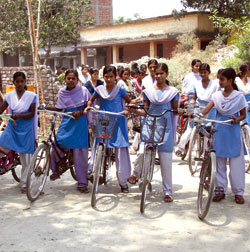 |
As the bell sounds the end of the school day at Rohua state high school in Bihar, India, students in blue and white school uniforms stream out of their classrooms. Two thirds of them are girls.
The school is a long way from home and girls like Anguri Khatoon ride 5 km roundtrip every day to get to class. The ninth-grader returned to school last year after a three-year gap, mainly because the bicycle shortened her commute.
"My father is poor, he couldn't afford a bicycle and that is why I had to drop out of school," she says, "now I have my bicycle I'm happy to be back at school."
Five years ago, the Bihar government distributed bicycles to encourage girls like Khatoon to go to school. The program � now adopted in several other states in India � has been so successful that it has boosted the female literacy rate in what used to be India's poorest state.
Mukhyamantri Balika Cycle Yojna (Chief Minister's Cycle Scheme for Girls) was started in 2007 for students in Grade 9 and above by Bihar's Nitish Kumar, who is largely credited with the transformation of his state. There used to be 2.5 million children out of school in Bihar, after the scheme ws started that has dropped to 770,000. In Rohua's school itself only 40 per cent of students used to be girls, now it is more than 60 per cent.
While poor parents often prioritise sons' education, the bicycle scheme has seen many girls return to class, says Rohua school principal Shashi Bhushan Prasad Singh. "Bicycles have changed things for village girls who chose to stay at home," she says, "now they're coming to school regularly."
Village women in Bihar traditionally only do household chores or unskilled labour. Girls often get little attention from their parents because eventually they will get married and go to their husband's family home. Although many families own bicycles, girls rarely get the chance to use them to go to school, but now that the girls have their own bicycles, changes are taking place.
"Many of these girls are from very poor families. Their houses, their diet and their clothes, everything is very pitiable, but their thinking started to change after they got the bicycles," says Singh. "Girls who never left their houses before are now coming out and performing very well in school."
More than 1.2 million bicycles have been distributed to Bihar's school-age girls over the last five years and now the number of girls in Grade 9 has crossed 600,000, an astounding six-fold increase.
The impact of educated girls helps develop society, explains Ramchandra Mandal of the Bihar Education Department. "If we educate a boy we educate one person, but educating a girl means sending the light of education to many. Her children will never remain illiterate," he explains.
Women's rights activist Sangeeta Shahi says that distributing bicycles to girls has also given them a sense of independence and empowerment. She says: "Until recently village mothers could not dream of their daughters attending school, but today the girls have come out to fulfil their mothers' dreams."
Shaikh Azizur Rahman in Bihar
Read also:
Winds of change, ANURAG ACHARYA and NAVIN JHA in BIHAR
Bihar is on the right track, but it still has a long way to go


